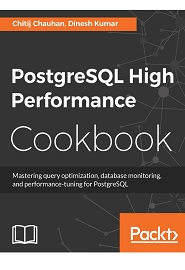
English | 2017 | ISBN: 978-1785284335 | 360 Pages | PDF | 10 MB
Get to know effective ways to improve PostgreSQL’s performance and master query optimization, and database monitoring.
PostgreSQL is one of the most powerful and easy to use database management systems. It has strong support from the community and is being actively developed with a new release every year. PostgreSQL supports the most advanced features included in SQL standards. It also provides NoSQL capabilities and very rich data types and extensions. All of this makes PostgreSQL a very attractive solution in software systems.
If you run a database, you want it to perform well and you want to be able to secure it. As the world’s most advanced open source database, PostgreSQL has unique built-in ways to achieve these goals. This book will show you a multitude of ways to enhance your database’s performance and give you insights into measuring and optimizing a PostgreSQL database to achieve better performance.
This book is your one-stop guide to elevate your PostgreSQL knowledge to the next level. First, you’ll get familiarized with essential developer/administrator concepts such as load balancing, connection pooling, and distributing connections to multiple nodes. Next, you will explore memory optimization techniques before exploring the security controls offered by PostgreSQL. Then, you will move on to the essential database/server monitoring and replication strategies with PostgreSQL. Finally, you will learn about query processing algorithms.
What You Will Learn
- Build replication strategies for homogeneous and heterogeneous databases
- Test and build a powerful machine with multiple bench marking techniques
- Get to know a few SQL injection techniques
- Find out how to manage the replication using multiple tools
- Benchmark the database server using multiple strategies
- Work with the query processing algorithms and their internal behaviors
- Build a proper plan to upgrade or migrate to PostgreSQL from other databases
- See the essential database load balancing techniques and the various partitioning approaches PostgreSQL provides
- Learn memory optimization techniques and database server configurations
Resolve the captcha to access the links!